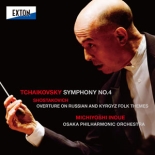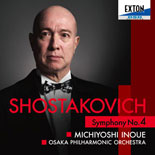~ショスタコ交響曲全曲演奏プロジェクト・井上道義を追う~ 【4】
―とにかく、このプロジェクトの概要を聞いてびっくりしました。率直に、どうしてこのようなことを考えたのですか?
|
1999年から2000年にかけて、新日本フィルとマーラーの全曲をやりましたが、ショスタコーヴィチはね、05年の最初に、来年は生誕100年だなってところから考え始めました。
そのころ岩城(宏之)さんが大晦日にベートーヴェンの交響曲9曲を1日でやっていて、でもショスタコーヴィチは15曲あるから1日じゃ絶対全部できないよなぁと思っていました。かといって、1週間で全曲も無理なんです、この作曲家は。
というのも、ベートーヴェンはオーケストラの基本レパートリーなんですよ。だから一応、楽員さんは形が見えているし、聴くほうも曲を知っているから短期でもできる。マーラーの場合は、あれは映画から発生した一種のブームがあって、CDという曲の長さに耐えられる媒体がでてきたということもあって、世の中に広まって全曲演奏会ができた。ショスタコーヴィチの場合は、そうした条件に全部当てはまらない。だから「全曲は無理かな?」と諦めかけていた。
でもショスタコーヴィチ・イヤーだった06年になっても、みんな意外とショスタコ
ーヴィチを演奏しなかったんですよ。なぜやらないんだろう?
こんないい作品が色々あるのに……となると逆に僕の血が騒ぎ始めた(笑)。
僕はね、なるべくメジャーな路線じゃないところで、いつも自分の生き方をぶつけてきているんですよ。クラシックをやるというのはそういうことだと思うんです。
ポピュラーになろう、金持ちになろう、野望とか野心でやるんだったらクラシックでやる必要はないわけで、僕はクラシックをやることで自分の居場所を探している。
クラシックが好きな人たちは、社会全体の向いている方向じゃないものに興味を持っている人、すごくとんがった人が多いんじゃないかと思っているんです。
僕自身もそういうところがあるので、周りがやらないなら、僕がやりたいっ!
となる。それから、今回のようにゼロから始める大きなプロジェクトは、体力があるうちにやりたい。たぶんブルックナーなら90歳でも振れるけど、ショスタコーヴィチは80歳では振れないと思うんだね。
|
|
―日比谷公会堂を会場に選んだ理由は?
ある時、ピカッときた。というのは、実際、ホールを押さえようとしたら、すでに予約がいっぱいで。サントリーホールなり、オーチャードホールなり、東京オペラシティなり、思うように借りられないんですよ。サイクルをやるとしたら、1カ月、たとえば土、日、土、日、土、日と借りられない! これは参った!と思っているうちに、日比谷公会堂が突然ひらめいた。そして、実際、運よくひと月まるまる貸していただけることになった。
同時に、このホールを何とかできないか、とも思い始めたわけです。
僕と同じ60歳以上の人は、だいたいコンサートは日比谷公会堂で聴いているんですよ。東京文化会館がない時代、戦前から日比谷公会堂はあって、母親たちも聴いているし、僕の先生たちもみんなあそこで演奏している。
そんなホールが、今は全然使われていない。古いし、階段しかないから当然だと思っていたんだけど、ヨーロッパだとあのくらいの古さのホールなんて山盛りある。ウィーンのムジークフェラインだってエレベーターはあるけれど、エスカレーターはない。日比谷公会堂は、そんなにひどかったかなと思い出してみたら2階で聴いたときの記憶は悪くないんですよ。演奏が悪かった記憶はたくさんあるけど。2階席がかぶさっている1階後列の音はよくないことはわかるんだけど、2階席は悪くないんですよ。中学のころに聴いたシャルル・ミュンシュ指揮、日フィルの《第九》も、音が悪かったとは記憶していないんですよね。しかも今回の場合、サントリーホールのよう暖かく包むというよりも、ショスタコーヴィチは冷たく、対峙するという音楽だから、意外といけるんじゃないかと思って、この選択は正しいと思うようになった。
考えれば考えるほど、あんないい立地条件にあるホールが、東京のクラシックの中心として機能しないのか疑問に思えてきた。周りにはたくさん会社がある、銀行も官公庁もある。ほかのホールより、場所的にはずっといいんだよ。
音楽会終わったあと公園があるし、食べるところもあるし。地下鉄も近くだし、タクシーも拾えるし。仕事したあとパッと行けるし。そんな日比谷公会堂を、もう少しなんとかしないと、と思った。
実際、学生のころから知ってる若い知り合いを日比谷公会堂に連れていったら、「すごい! こんなホールがあったんですか!なんて品がいんでしょう!感動ものです!」なんて言うんですよ(笑)。でも、なるほどね、と思った。僕なんか見るとぼろいって思うんだけど(笑)、彼から見るとレトロだって。
だから今回のプロジェクトでは、むかし日比谷公会堂を訪れた人と、今まで一度も来たことがない人が混ざることで、何か価値の転換が起こるのではないかと、期待しています。
|
|
―マエストロがショスタコーヴィチの音楽に最初に触れたのは?
それはもう学生の時!
桐朋学園で齋藤秀雄先生の指揮で、1番のシンフォニーをやりました。
|
|
―実際(コントラバスで)弾いてみての印象は?
19歳でこんなもん書きやがって! 俺、同い年じゃねーか! と思いながらやってたよね。
(※楽器演奏はピアノのほか、学生時代に弦楽器からコントラバス、管楽器はトロンボーンを専攻した)
|
|
―その後、京都市交響楽団の音楽監督時代(1990―98年)には、ショスタ
コーヴィチを積極的に演奏されました。
当時は京都会館で演奏会をしていて、お客は入らない、ホールは響きが悪い。オーケストラは男ばっかりで色気がない(笑)。これで何ができるだろう? ということでショスタコーヴィチを毎年必ずやろうと思った。ショスタコーヴィチをやると無理やりにホールが鳴るんですよ。それからショスタコーヴィチは、基本的に「男の音楽」だからね。あのころ、定年ギリギリの男どもがすごくたくさんいて、男の音楽ができた。
あのころ、僕自身もショスタコーヴィチに対する固定観念があったけれど、それが楽譜を読んだり、いろんな資料を読んでいくうちに変わってきた。それから、ショスタコーヴィチの息子マキシムや、ロストロポーヴィチ、ロジェストヴェンスキー、作曲家の若いころ親友だったソレチンスキーという人の息子さんなどから、彼の人となりや、実際あのころ何が起こったかを聞いた。
すると、よく言われるショスタコーヴィチと政治との兼ね合いは、思ったほどないという結論に達したんです。何でもかんでも政治とのぶつかりあいだとか、ソビエトとの絡みで解決しようとする文章があるんだけど、実際はそんなもんじゃないと!
言ってみればベートーヴェンをフランス革命とばかりくっつけて考え、《エロイカ》交響曲を考えることぐらいばかばかしいことないんですけど、そういう解説書がいらなくなってくると、ショスタコーヴィチの音楽がさらに面白くなってきた。
変な話、たとえば、自動車に乗って、CDつけて、山道をキュッキュッキュッキュッ飛ばしながら聴くには、ショスタコーヴィチがピッタリなんですよ。そんな感じに音楽をとらえてもいいんじゃないかと僕は考えている。別に、それがすべてとは思わないけれど、音楽は何か意味があるかというとないわけで、楽譜と音しかないわけ。そこで、時代が変わったところからもう一回見直すことが面白いんじゃないかと思ったんですね。(以下 次号に続く)
|
|
[4] Inoue talks the real intention of the Shostakovich-project
Interview in the July/August issue of "Art Gaia" Magazine. (complete contents)
―Anyway, I was surprised to hear the brief overview of the project. Frankly, what made you plan so?
I conducted all of the Mahler with the New Japan Philharmonic from 1999 to 2000. As for Shostakovich, I started thinking in the beginning of 2005 as the next year is his 100th anniversary of his birth.
At that time Mr. Iwaki (Hiroyuki) was conducting the Beethoven's 9 symphonies on the New Year's Eve. I thought it would be impossible to finish Shostakovich's 15 symphonies in one day, or, also impossible to complete this composer in one week. That is because the Beethoven's are basic repertoire of the orchestra. That's why, the players can overview, and make it possible in a short period of time due to the fact that the audience knows it. On the contrary, Mahler became a kind of boom by a film, at the same time, the medium called CD was invented, that can bear the length of the music, and the music wide spread in the world so that I could hold the concert with all of his music. However, Shostakovich does not match any of the conditions like that. I was about to give up, "It might be impossible to conduct all".
Unexpectedly, nobody was playing Shostakovich even after the Shostakovich year 2006 came. How come? There are so many wonderful pieces of work... then I got to be motivated (laugh).
As for me, I reflect my life by conducting music that is not famous, mainly. I believe this is how to pursue classical music. No need to take part in classical music if you want to be popular and rich, with this kind of ambition. I find my place by being engaged in classical music. Those who like classical music are often the ones who are interested in things that do not arouse curiosity of society, in other words, they are thorny people. I guess I am one of them, and if nobody else did, I would feel like doing so. Especially when it comes to the big project like this, I should achieve while I have enough physical strength. If it was the case of Bruckner、I would be able to take a baton at the age of 90, but as for Shostakovich, I wouldn't be even 80 years old.
―Why did you choose the Tokyo Metropolitan Hibiya Public Hall?
Lightning raced down my spine. To be honest, I couldn't book a hall-the Suntory hall、the orchard hall, the opera city hall, etc… were all fully booked. We needed to book it repeatedly for a month, for instance, every Saturday and Sunday. That was a facer! Suddenly, The Hibiya Public Hall came into my mind, and happened to be able to reserve it all through the month. At the same time, I started to think if I could do something for the hall. Many people whose ages are over 60 go to concerts at the Hibiya Public Hall.
When the time there was no Tokyo Festival Hall, the Hibiya Public Hall was already there before the War, our mother's generation used to go, and all my teachers used to play there, as well.
Such a hall is not used at all now. Indeed it is old, and there are only stairs. However, there are plenty of halls as old as it in Europe. Although Musikverein in Vienna has a lift, but there is no escalator. I was wondering if the Hibiya Public Hall is that bad, but remembering the time I listened on the balcony seat, the quality was not bad, though I've had a lot of experience to listen to the bad quality of performance. I can see the parquet circle would not be perfect to listen, but the balcony is not bad.
The <> under the baton of Charles Munch I listened when I was a junior high school student did not remind me of bad quality of the sound. In addition, the Shostakovich's music is cold and confronting music so that it would match the Hibiya Public hall rather than the Suntory hall that fills the place with kindness. Therefore, I got to think my decision was right, and things will be alright.
As I think it over, I cannot help thinking why the hall like that does not function as a centre of Tokyo classical music since it is located in such a good place. Not only companies are around, but banks and government and other public offices are there. The location is much better than any other halls. You can enjoy spending time at the park after the concert, and there are places to eat out. It's very close to the Metro, easy to catch a taxi, and able to go directly from the office after work. I thought I had to do something for the Hibiya Public hall. In fact, when I took my acquaintance from my school days there, he said, "Great! I didn't know there is a hall like this! How elegant it is! Stunning!" (Laugh) Well, it was understandable. It seems to me ancient (laugh), but retrospect to him. That's why; I expect to have a kind of change of value in this project by meetings of the first visitors and those who have once come to the Hibiya Public Hall.
―When was the first time you encountered Shostakovich?
When I was a student!
I played the 1st symphony under my teacher Mr. Hideo Saito at Toho Gakuen.
―How did you feel when you actually played it (with contrabass)?
How dare he wrote something like this! I'm at the same age! I was thinking in that way.
―Later, at the time when you were a music director of the Kyoto Symphony Orchestra (1990-98), you positively played Shostakovich.
At that time, not many audiences were coming, the quality of the sound of the hall was bad, and the orchestra members were all men and opposite-of-glamorous. (Laugh) What can I do then? The answer was to play Shostakovich every year. Shostakovich's music forces the hall sound. What's more, Shostakovich is basically, "Music of Man". At that time, there were full of men just before their retirement age, and that enabled to perform the music of man. I used to have the fixed concept about Shostakovich myself, but the idea gradually changed as I went through his scores and various materials. Then, I heard stories how he was and what actually happened to Shostakovich from his son Maxim, Rostropovich, Rozhdestvensky, and a son of the composer Sorochinsky who used to be his best friend in his youth.
I reached the conclusion that there was not much connection between Shostakovich and politics as expected. It is often said it was the conflict against the politics, or something to do with the Soviet Union, but the truth is far from it. In other words, it is as silly as connecting the Beethoven to the French Revolution, and thinking about the <> symphony. Getting rid of these guide books, the Shostakovich's music became more interesting.
In a backward way, Shostakovich perfectly goes well when shooting in the mountain road with the car.
Why not treating music like that? Of course it is not all about music, but music does not really have its meanings, just has its score and sound. So, I felt it's interesting to review it at a different time of view.






